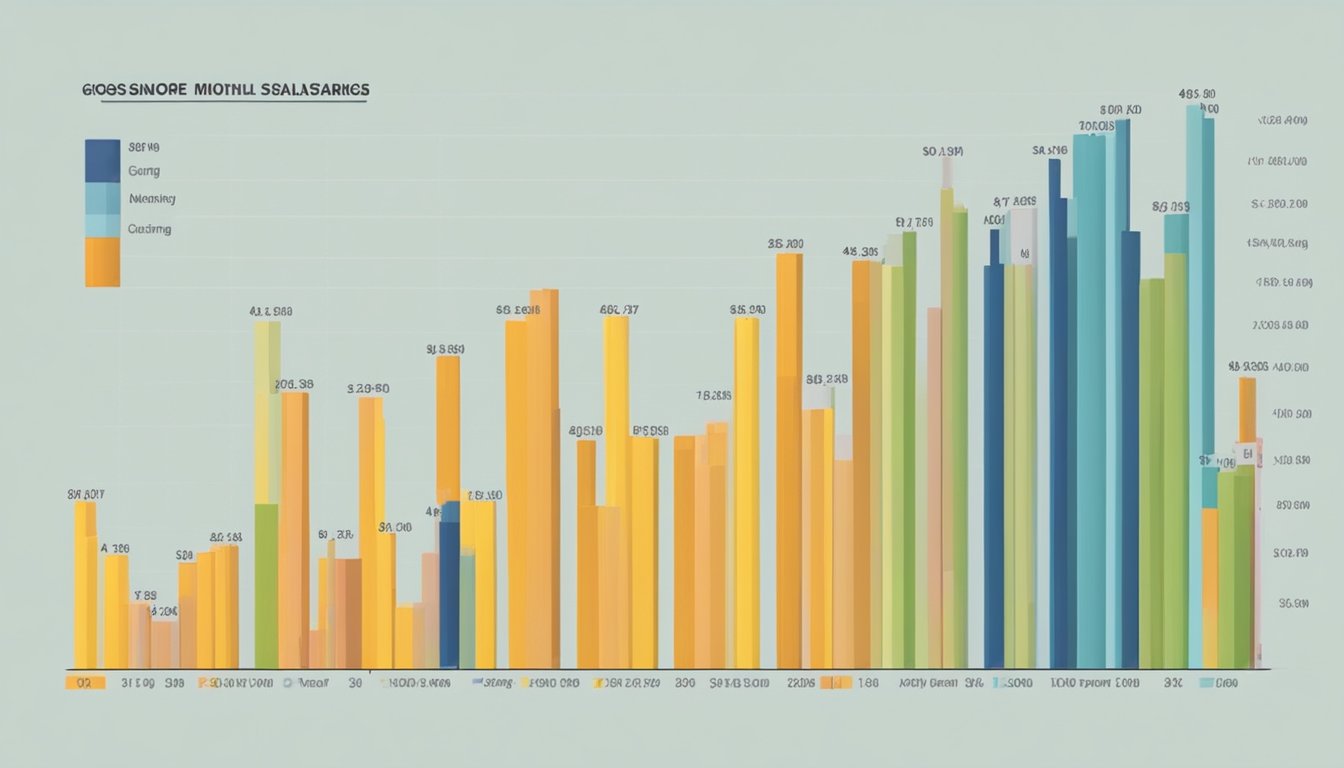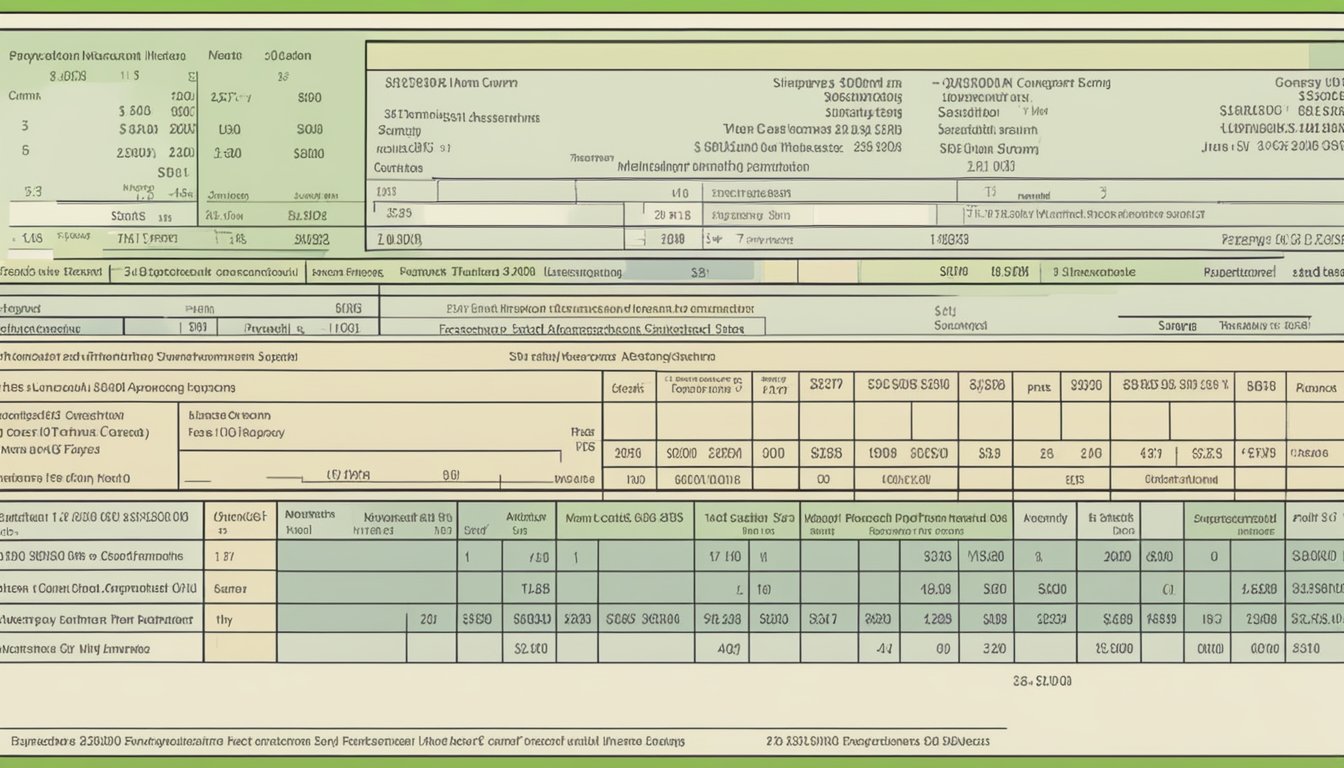Introduction

If you are working in Singapore, you must be familiar with the term “gross monthly salary.” This is the amount of money you earn before any deductions, such as taxes and contributions. Understanding your gross monthly salary is important because it helps you to budget your expenses, plan for your future, and negotiate your salary.
Legal Framework for Salaries in Singapore
The legal framework for salaries in Singapore is governed by the Employment Act. This act sets out the minimum standards for employment, including the minimum wage, working hours, and leave entitlements. However, it does not set a minimum salary for employees. The salary is usually determined by the employer and the employee, based on factors such as experience, qualifications, and job responsibilities.
Key Takeaways
- Understanding your gross monthly salary is important for budgeting, planning, and negotiating your salary.
- The legal framework for salaries in Singapore is governed by the Employment Act, which sets minimum standards for employment but does not set a minimum salary.
- Your salary is usually determined by your employer and you, based on factors such as experience, qualifications, and job responsibilities.
Understanding Gross Monthly Salary in Singapore

When it comes to understanding your monthly income, it’s important to know what makes up your gross monthly salary in Singapore. Your gross monthly salary is the total amount of money you earn before any deductions are made, including taxes, CPF contributions, and other deductions.
Components of Gross Monthly Income
Your gross monthly income includes several components, such as your basic wages, overtime pay, tips, allowances, bonuses, and commissions. Here’s a breakdown of what each of these components means:
- Basic wages: This is the fixed amount of money you receive each month for your job.
- Overtime pay: This is the additional pay you receive for working beyond your normal working hours.
- Tips: This is the extra money you receive from customers as a reward for good service.
- Allowances: This is the additional money you receive for things like housing, transport, and other expenses related to your job.
- Bonuses: This is the extra money you receive as a reward for good performance or achieving certain goals.
- Commissions: This is the extra money you receive for selling products or services.
Calculating Gross Monthly Income
To calculate your gross monthly income, you need to add up all the components of your income. If you’re paid on an annual basis, you can divide your annual earnings by 12 to get your gross monthly income. For example, if you earn $60,000 per year, your gross monthly income would be $5,000.
It’s important to note that your gross monthly income is different from your net monthly income, which is the amount of money you take home after deductions. To calculate your net monthly income, you need to subtract your CPF contributions, taxes, and other deductions from your gross monthly income.
In conclusion, understanding your gross monthly salary in Singapore is crucial to managing your finances effectively. By knowing what makes up your income and how to calculate it, you can make informed decisions about your finances and plan for your future.
Legal Framework for Salaries in Singapore

When it comes to salaries in Singapore, there are several regulations that employers and employees need to be aware of. This section will cover the key legal frameworks that govern salaries in Singapore.
Employment Act Regulations
The Employment Act is the main legislation that governs employment practices in Singapore. It sets out the minimum standards for employment conditions, including salaries. Under the Act, employers are required to pay salaries to their employees at least once a month. Salaries must be paid within seven days after the end of the salary period. Employers are also required to provide itemised payslips to their employees.
The Act also sets out the regulations for overtime pay. Employees who work beyond their normal working hours are entitled to overtime pay. The rate of overtime pay is usually 1.5 times the hourly basic rate of pay. However, this may vary from profession to profession.
Minimum Wage Standards
Unlike many other countries, Singapore does not have a minimum wage law. Instead, the government sets out guidelines for employers to follow. The National Wages Council (NWC) issues annual guidelines on wage increases for workers in Singapore. The guidelines take into account factors such as the state of the economy, productivity growth, and the need to maintain Singapore’s competitiveness.
Employers are encouraged to follow the NWC guidelines when determining the salaries of their employees. However, the guidelines are not mandatory. Employers are free to set their own salaries as long as they meet the minimum standards set out in the Employment Act.
In conclusion, the legal framework for salaries in Singapore is designed to protect both employers and employees. Employers are required to pay salaries on time and provide itemised payslips, while employees are entitled to overtime pay. The absence of a minimum wage law means that employers have the flexibility to determine salaries based on their business needs, while following the guidelines set out by the NWC.
Statistical Insights on Salaries

If you’re interested in knowing more about gross monthly salaries in Singapore, you’re in luck! There are a variety of statistics available that can help you understand the median salary and income growth trends, as well as annual wage changes and wage increases.
Median Salaries and Income Growth
According to the Ministry of Manpower, the median gross monthly income from employment in Singapore was $4,563 in 2023. This is the income in the middle, after the workers are ranked by their income. It’s worth noting that this figure includes both employees and the self-employed.
In terms of income growth, the median gross monthly income from employment has increased steadily over the past few years. In 2019, the median gross monthly income from employment was $4,437, which increased to $4,563 in 2023.
Annual Wage Changes and Wage Increases
Annual wage changes and wage increases are important factors to consider when looking at gross monthly salaries in Singapore. According to the Ministry of Manpower, the nominal increase in median gross monthly income from employment was 4.8% in 2021, and 3.5% in 2022.
It’s also worth noting that the annual wage changes and wage increases can vary depending on the industry and occupation. For example, the Straits Times reported that the information and communications industry saw the highest salary increase in 2023, with a median gross monthly income of $7,500, while the food and beverage industry had the lowest median gross monthly income of $2,500.
Overall, the statistics on gross monthly salaries in Singapore provide valuable insights into the labour force and wage trends. By keeping an eye on these statistics, you can gain a better understanding of the current state of salaries and income growth in Singapore.
Taxation on Personal Income

If you are working in Singapore, it is important to understand how your gross monthly salary is taxed. In this section, we will discuss the deductions made to your income, including income tax and employee CPF contributions.
Understanding Income Tax Deductions
As a resident of Singapore, you are required to pay personal income tax on your income. The current personal income tax rates are progressive, meaning that the higher your income, the higher the tax rate you will pay. The highest personal income tax rate is currently 22%, but it will be increased to 24% from the year of assessment 2024.
Non-resident individuals, on the other hand, are taxed at a flat rate of 22% (24% from year of assessment 2024), except for employment income which is taxed at a flat rate of 15% or at resident rates with personal reliefs, whichever yields a higher tax.
To calculate your income tax, you can use the sample income tax calculations provided by the Inland Revenue Authority of Singapore (IRAS). These calculations take into account your employment income, donations, and personal reliefs.
Employee CPF Contributions
In addition to income tax, you are also required to make contributions to the Central Provident Fund (CPF). CPF is a social security savings scheme that helps Singaporeans save for retirement, healthcare, and housing needs.
As an employee, you are required to contribute a percentage of your gross monthly salary to your CPF account. Your employer is also required to make contributions on your behalf. The current CPF contribution rates are as follows:
| Age Group | Employee Contribution Rate | Employer Contribution Rate |
|---|---|---|
| Below 55 | 20% | 17% |
| 55 and above | 13% – 17% | 13% – 17% |
The exact contribution rates may vary depending on your age and income. You can check your CPF contributions using the CPF contribution calculator provided by the CPF Board.
Overall, it is important to understand the deductions made to your gross monthly salary in Singapore. By knowing how your income is taxed and how much you are required to contribute to CPF, you can better plan your finances and prepare for your future needs.
Maximising Your Salary Package

When it comes to maximising your salary package, there are a few things you can do to ensure you’re getting the most out of your job. In this section, we’ll cover some tips on negotiating salaries and benefits, as well as other allowances and annual bonuses that you might be entitled to.
Negotiating Salaries and Benefits
One of the most important things you can do to maximise your salary package is to negotiate your salary and benefits when you’re starting a new job. Before you start negotiating, it’s important to do your research and find out what other people in your industry are earning. You can use online resources such as salary surveys to get an idea of what the average salary is for your job.
When negotiating your salary, it’s important to be confident and assertive. You should be prepared to explain why you think you’re worth a certain amount, and be willing to negotiate if necessary. You should also consider negotiating other benefits, such as flexible working hours, extra holiday time, or insurance packages.
Other Allowances and Annual Bonuses
In addition to your basic salary, there may be other allowances and annual bonuses that you’re entitled to. These can include things like transport allowances, housing allowances, and medical benefits. It’s important to find out what allowances and bonuses you’re entitled to, and to make sure you’re taking advantage of them.
Annual bonuses are another way to maximise your salary package. Many companies offer annual bonuses based on performance, so it’s important to work hard and strive for excellence in your job. You can also negotiate your bonus when you’re starting a new job, or when you’re reviewing your contract.
Overall, maximising your salary package requires a bit of research and negotiation. By doing your homework and being confident in your abilities, you can ensure that you’re getting the most out of your job. So go ahead and negotiate that salary, and take advantage of all the benefits and bonuses that you’re entitled to!
Frequently Asked Questions

What does ‘gross monthly salary’ entail in Singapore?
Your gross monthly salary in Singapore refers to the total amount of money you earn before any deductions, such as taxes or employee contributions to the Central Provident Fund (CPF), are made. It includes your basic salary as well as any fixed monthly allowances and other recurring payments, such as housing or transport allowances.
How can one calculate their gross monthly salary in Singapore?
Calculating your gross monthly salary in Singapore is relatively straightforward. If you are paid a fixed monthly or yearly salary, you can determine your gross monthly income by dividing your annual earnings by 12. For example, if you make $60,000 per year, your gross monthly income would be $5,000. $60,000 ÷ 12 = $5,000.
What’s the difference between gross salary and basic salary in the context of Singapore?
In Singapore, your basic salary refers to the amount of money you earn before any additional payments or allowances are added. Your gross salary, on the other hand, includes your basic salary as well as any additional payments or allowances you receive, such as housing or transport allowances.
Does the gross salary figure in Singapore include contributions to the Central Provident Fund (CPF)?
Yes, your gross salary figure in Singapore includes your contributions to the Central Provident Fund (CPF), which is a mandatory savings scheme for employees. Both employers and employees are required to contribute a percentage of the employee’s salary to the CPF.
How does the Ministry of Manpower (MOM) define ‘gross rate of pay’ in Singapore?
According to the Ministry of Manpower (MOM), the gross rate of pay in Singapore refers to the total amount of money that an employee is entitled to receive before any deductions are made, including CPF contributions, taxes, and other deductions.
What constitutes a competitive gross monthly salary in Singapore?
The amount of a competitive gross monthly salary in Singapore can vary depending on a variety of factors, including the industry, job role, and level of experience. According to a survey of 11,200 graduates, the median gross monthly salary for full-time permanent jobs had increased from $3,600 in 2019 to $3,800 in 2021. However, it’s important to note that this figure is just a median, and many employees earn more or less than this amount depending on their specific circumstances.




